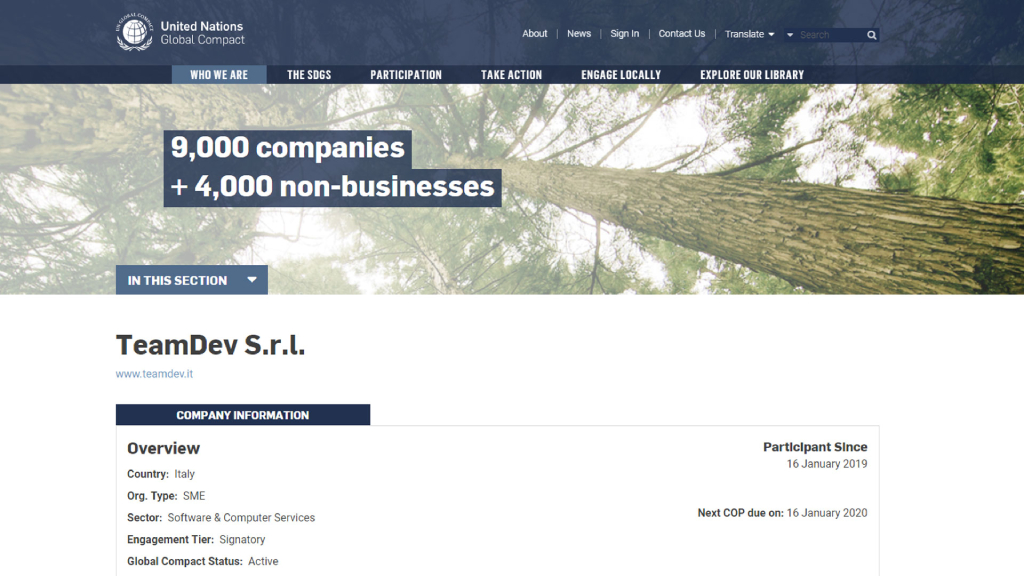Deeply in line with the values of the company, TeamDev is happy to announce its participation in the United Nations Global Compact.
UN Global Compact
Launched in 2000, the United Nations Global Compact is the largest corporate responsibility initiative in the world. It is a leadership platform for the development, implementation and dissemination of responsible corporate policies and practices.
The initiative is an invitation to companies around the world to voluntarily align their operations and strategies with ten universally accepted principles in the areas of human rights, labor, environment and fight against corruption. In addition it aims to take actions in support of the objectives of the UN, including SDGs.
It makes sense for companies to invest in creating a solid environment in which to do business by supporting emerging and developing markets.
As commercial interests increasingly overlap with society’s interests and development goals, responsible business practices and intersectoral partnerships play a more important role than ever.
To promote a more inclusive and stable global market, the active commitment of companies will be fundamental. At the same time, responsible business practices not only contribute to the well-being of stakeholders, but have increasingly become a long-term value proposition for the business itself.
The UN Global Compact is:
- a voluntary initiative to promote sustainable development and good corporate citizenship
- a set of values based on universally accepted principles
- a network of companies and other interested parties
- a forum for learning and exchanging experiences.
The ten principles of the United Nations Global Compact
Corporate sustainability begins with a company’s value system and a principles-based approach to doing business. This means operating in ways that, at a minimum, respond to fundamental responsibilities in the fields of human rights, work, environment and the fight against corruption. Responsible companies promote the same values and principles wherever they are present and know that good practices in one area do not compensate for damage in another.
By incorporating the ten principles of the United Nations Global Compact into strategies, policies and procedures and establishing a culture of integrity, companies not only support their fundamental responsibilities for people and the planet, but are also preparing the ground for success in long term.
The ten principles of the United Nations Global Compact derive from: the Universal Declaration of Human Rights, the Declaration of the International Labor Organization on Fundamental Principles and Rights at Work, the Rio Declaration on the Environment and Development and the Convention of the Nations United against corruption.
Human rights
Principle 1: businesses should support and respect the protection of human rights proclaimed internationally;
Principle 2: make sure they are not complicit in human rights violations.
Work
Principle 3: businesses should support freedom of association and effective recognition of the right to collective bargaining;
Principle 4: the elimination of all forms of forced and compulsory labor;
Principle 5: the effective abolition of child labor;
Principle 6: elimination of discrimination in employment and occupation.
Environment
Principle 7: businesses should support a precautionary approach to environmental challenges;
Principle 8: undertake initiatives to promote greater environmental responsibility;
Principle 9: encourage the development and diffusion of environmentally friendly technologies.
Anti corruption
Principle 10: Firms should work against corruption in all its forms, including extortion and corruption.
The UN Global Compact today has over 9,000 signatories based in over 135 countries.
From January 2019 TeamDev is also among the participants in the initiative:
Iscriviti alla Newsletter!
Ricevi in esclusiva le più rilevanti novità sull’Industria 4.0






